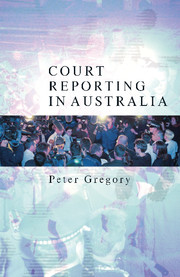Book contents
- Frontmatter
- Contents
- Figures and Tables
- Acknowledgments
- Introduction
- Chapter 1 The Court System: An Overview
- Chapter 2 Gaining Information
- Chapter 3 Contempt
- Chapter 4 Defamation
- Chapter 5 Writing the (Newspaper) Story
- Chapter 6 Subediting and Photography
- Chapter 7 Television and Radio
- Chapter 8 Human Relations and Ethics
- Chapter 9 An Atypical Friday at Court
- Chapter 10 Suppression Orders
- Chapter 11 Future Directions and Issues
- Bibliography
- Index
Chapter 9 - An Atypical Friday at Court
Published online by Cambridge University Press: 22 September 2009
- Frontmatter
- Contents
- Figures and Tables
- Acknowledgments
- Introduction
- Chapter 1 The Court System: An Overview
- Chapter 2 Gaining Information
- Chapter 3 Contempt
- Chapter 4 Defamation
- Chapter 5 Writing the (Newspaper) Story
- Chapter 6 Subediting and Photography
- Chapter 7 Television and Radio
- Chapter 8 Human Relations and Ethics
- Chapter 9 An Atypical Friday at Court
- Chapter 10 Suppression Orders
- Chapter 11 Future Directions and Issues
- Bibliography
- Index
Summary
Knowing about courts is one thing; applying the knowledge is another. In a textbook world, a reporter could choose the story of the day, turn up at the courtroom, scribble some notes, quickly organise an interview and photograph, and neatly compose an article which respectful subeditors would run in full on a prominent page of the newspaper. The reality is somewhat different. Conflicting timetables, judges who turn up late to deliver a sentence, the discovery that a competitor has been missing all morning, are typically nightmarish practicalities. So how do you convey that to readers? The following ‘reality-reporting’ exercise aims to give some clues. Current and former court reporters, from radio, television and newspapers, were given a hypothetical horrible Friday at the courts where potential stories exist in multiple jurisdictions in a crowded timetable. Using an hourly timeline, the reporters were invited to plot their day and choose the cases they believed were newsworthy for their medium and employer.
First, an apology to non-Victorians and rural dwellers. For practical reasons, I have chosen Melbourne courts and journalists who work or have worked in them. Some rules will be different in other States, and in other cities fewer reporters may spend their time at the courts. The exercise is designed to show the way decisions are made. I have not named the journalists or their organisations. Some participants were concerned that their comments in a hypothetical exercise might be taken as the policy of their outlet.
- Type
- Chapter
- Information
- Court Reporting in Australia , pp. 144 - 163Publisher: Cambridge University PressPrint publication year: 2005
- 1
- Cited by



